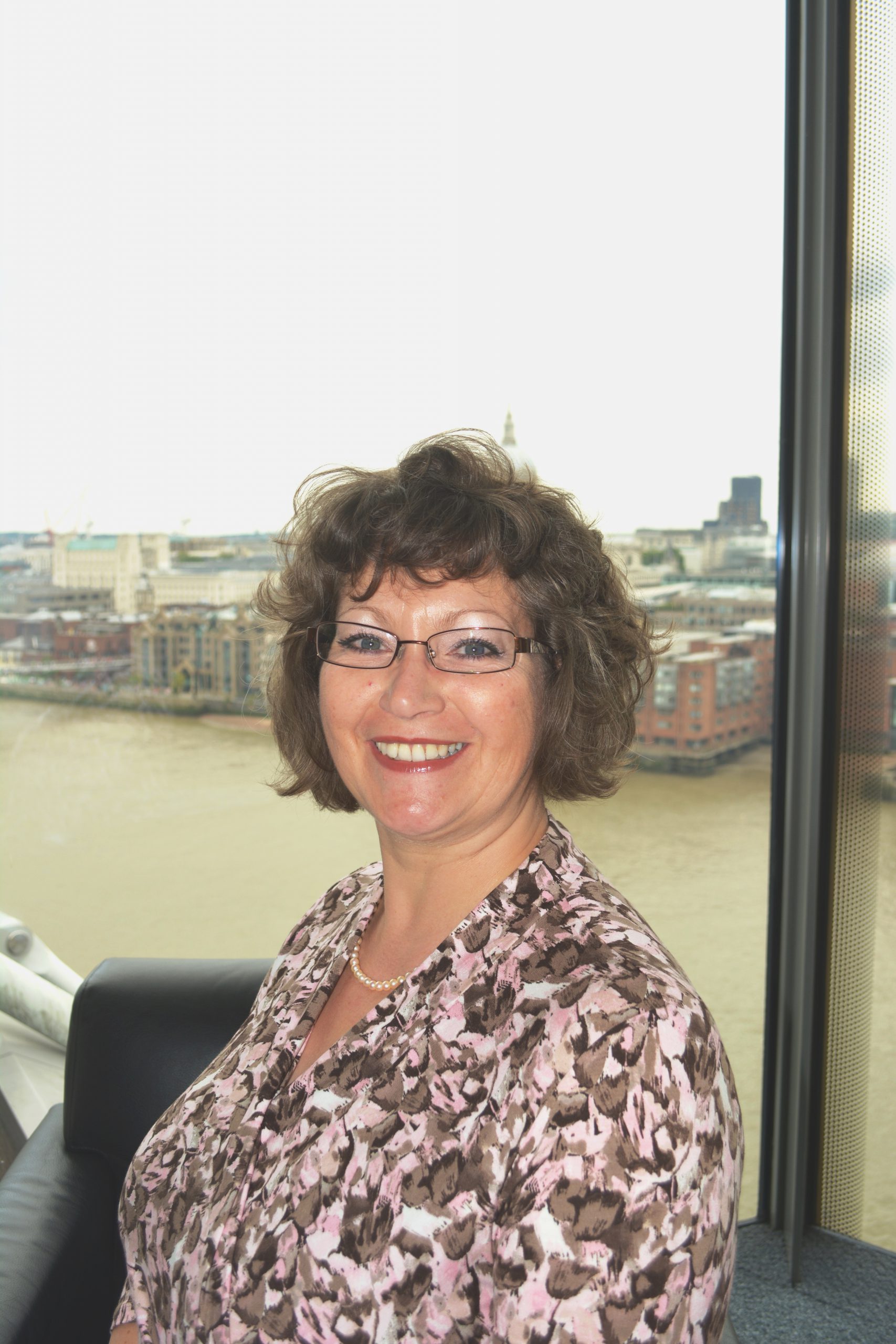
Joy Hannon talks about her experiences as an Assistant who is hard of hearing
Can we start with a little background information? Where are you from and what is your current role?
I’m actually a country lass. I was born and brought up in the Derbyshire countryside 54 years ago, and my mum still lives in the same village where she too was born – 93 years ago: I keep warning my husband that he’s in it for the long haul!
I started working at Ofcom three years ago and I think it’s a great place to work. I have the privilege of working for one of the best Regulators in Europe with colleagues who are really experts in their field. I assist three directors of spectrum policy, who are smashing chaps and fun to work with (but don’t tell them I said that) and they oversee some really interesting projects. Before I came here, the most I understood about the spectrum was that I know all the words to “I can sing a rainbow”! However, my understanding continues to improve and, as ever, as a PA you don’t really have to be on top of all the technicalities: to be a good PA you need to understand people. I think that being a PA is really all about how you interact and communicate with your colleagues, and if you’re good at it, you oil the wheels for your colleagues to communicate and interact with each other. And I never cease to find people, and what motivates us to work, fascinating.
What is your background?
After illness in my late teens, I was a late starter at university – and hated it! Towards the end of the first year, I decided to leave, but I had no idea what I wanted to do. My mum suggested I go to secretarial college to pick up some useful qualifications while I had a think about what came next and we had a really good local college that took me on to their Post Graduate Secretarial Diploma Course (even though I was missing the degree!). Lo and behold, I absolutely fell in love with the job, discovering that I had a flair for communication skills and organisation. After six years working in Sheffield, I wanted to spread my wings and came to London and I’ve now been here… rather a long time! I’ve worked in the education, health, government, church and construction sectors, to name but a few, and been extremely lucky for the most part. But my role here at Ofcom is probably my favourite.
You are becoming increasingly hard of hearing. That must be really difficult in a role that requires communication at its core. What happened and how has it changed your working life?
When I was in my early 20s, a lovely friend who was severely deaf, thought he detected that I was deaf too. I had some investigations and a consultant told me that my hearing wasn’t as sharp as it should be, that the root cause was either congenital or caused by birth trauma and he thought I might need a hearing aid when I was in my late 40s or early 50s. Cut to me at 47, watching television with John one evening when John commented on how loud I had the volume. I asked him to turn it down to what suited him – and I thought he’d muted the sound altogether! So I thought I’d better do something about it, and was referred to the Audiology Clinic at Guy’s & St Thomas’s Hospital, who look after me very well indeed, and now I wear hearing aids in both ears.
I am extremely lucky: my hearing is deteriorating but so far quite slowly, and I am still only moderately deaf, but it is enough to impact considerably on my life.
Being deaf is so different from what I thought it might be – it’s so much more than just not hearing very well. There are the obvious issues such as not hearing meetings and having trouble hearing the phone, but I’m helped there with a fantastic induction loop system plus the forbearance of my colleagues following good meeting etiquette (I can’t tell what anyone says at all if people talk over each other, for instance) and an adapter for my phone that boosts the volume and controls tone and will work on induction loop with my hearing aids. (The induction loop facilities here are stunningly good: if only they translated the science & technology so I could understand it, now that I can hear it!)
But deafness also affects so many other areas of work. I’m badly affected by background noise so I need to sit somewhere that’s not in the thick of things (open plan offices are not deaf-friendly!). I have to concentrate to hear, so it can be hard to make notes while people are talking so my ability to minute meetings isn’t what it was. One-to-one meetings need face-to-face communication and I can’t read something and hear at the same time. My directors are so patient!
The biggest surprise, which I hadn’t catered for at all, is that I find work so tiring now. Hearing, especially in meetings where there might be many speakers across a sizeable area, requires a level of concentration that is exhausting.
There are plenty of funny things as well. If you can’t hear, you really don’t know what someone’s said to you … or maybe they were talking to themselves? I’m forever asking people to repeat what turn out to be their Winnie-the-Pooh-like musings. Also, I simply can’t hear an alarm clock in the mornings! On the very rare occasions that John oversleeps, we both do! When John’s away, I have a small alarm clock that clips to my pillow and it shakes my head awake – not my favourite way to start the day!
You have just started a blog to raise awareness of deafness in the workplace. How did this come about and how is it of benefit?
Last year I attended the simply fantastic training course “Be the Ultimate Assistant” with Bonnie Low-Kramen and Vickie Sokol Evans (I cannot recommend it enough – do it!). Part of that was to give a two-minute presentation and I decided to talk about the one thing I knew – working as a deaf PA. My two minutes garnered a very encouraging reception and Bonnie and Vickie said I should do more, and suggested I should start a blog. From being dumb-struck at first, the idea grew and with the support of my fabulous friends in our Internal Communications team, especially the lovely Emma Louch, and the enthusiastic backing of my husband, https://joysallears.wordpress.com was born.
I’m hoping that other office workers who are experiencing similar difficulties might find my coping strategies of interest and useful, and might be inclined to share their own. And I hope that I might spread a little deaf awareness to the hearing community too. I’m always delighted when people comment on the blog and you can email me at joys.all.ears@gmail.com. I’ve also started going into offices to talk to other PAs about deaf awareness, which I’m enjoying hugely, and I’m slowly getting round all my colleagues in Ofcom addressing group meetings; Ofcom’s Corporate Responsibility programme is second to none.
What are the main changes you have seen in the time you have been in business?
It has to be the technology! When I started as a PA, I took hours of dictation every day and typed all notes, memos and letters – my first directors would never have let a thing called a computer darken their desks! No one had heard of emails, no one had video conferences and I even pre-date the first brick-size mobile phones! But I do remember being told at secretarial college by a male economics tutor that PAs would one day not be necessary and would be replaced by machines – the female tutors thought differently – good for them! One tutor said to me very early on, people will always prefer to work with people, and I’ve never forgotten that.
What or who inspires and motivates you?
All my fantastic PA colleagues near and far who are so generous with their time and experience – and here I must mention Victoria Darragh (we love you, Vic!) who has done so much for the profession. The Hays PAs Networking events Vic organises never fail to entertain and enlighten with the most inspiring speakers and I always come back to my job fired up with enthusiasm to be the best that I can be.
Bonnie Low-Kramen who, I’m very proud to say, has become a friend and who empowers more than any person I know. Bonnie has the wonderful knack of making you think that you can do it too. I’d never have started the blog nor sought to raise the profile of deaf awareness without her or Vickie Sokol Evans.
Reading! There are some fantastic resources out there for PAs, sharing skills and different approaches to work. And all women in the world – especially mothers of young daughters – should read Lean In by Sheryl Sandberg. I know, I know: being told you should read something is a terrible turn off, but you still should. And did I mention there’s a fab magazine called Executive Secretary?
What has been the highlight of your career so far and why?
I’m so lucky – I have a job I love with an organisation I’m really proud to be a part of. But I think the highlight so far has to be the work I’ve done around deaf awareness. I would so like to make a difference and help people. Geoff Adams-Spink, the author, journalist and broadcaster has spoken of his vision: “A society in which the needs of older and disabled people are woven into the very fabric. A world in which everyone – regardless of difference – is accorded dignity and respect.” How fabulous if I could play my own very small part in bringing that about! But, that is what is so fantastic about Geoff’s vision: we can all play a part.
What are the main challenges facing the industry at the moment?
I think it’s learning how to manage the non-stop availability that’s possible now. Modern communication (enabled and overseen by a good regulator, of course!) is simply miraculous, but we should work to live, not the other way around, and 24-hour accessibility endangers that.
What advice would you give someone just starting out as an Assistant?
Get a mentor and learn from all the great experience that’s gone before you. Network! Look at what’s available in your area, take a deep breath and dive in – it’s fun! Share your best practice with others – you will be repaid a thousandfold. Believe in yourself and, most importantly, always be proud to be a professional PA.
So what’s next for Joy Hannon? Where do you want to be in 5 years’ time?
I’ve recently become involved in a few projects outside my PA work and I’d love to develop that, whilst still assisting a great director or three. And I’d love to expand my deaf awareness work and give more presentations on the subject.
Of course, five years on, I will be deafer. Several months into wearing hearing aids, I had a bit of a panic and wondered what deafness might be bringing to an end. It’s actually ending very little, of course, but it has opened my eyes – and ears! – to doing things differently, and, what’s more, to thinking about how many of us need a different approach.
I think every single one of us faces a challenge to managing a job happily these days, be it a disability, a miserable commute, depression, an unhappy relationship or – and Lord knows how they manage it! – being a working parent. My own, very little, challenge is that I don’t hear so well. Learning how to cope – with a lot of loving support – is a challenge to be enjoyed. And if I can say the same in five years’ time, and say that I’ve helped a few others along the road, that would be just fantastic.













